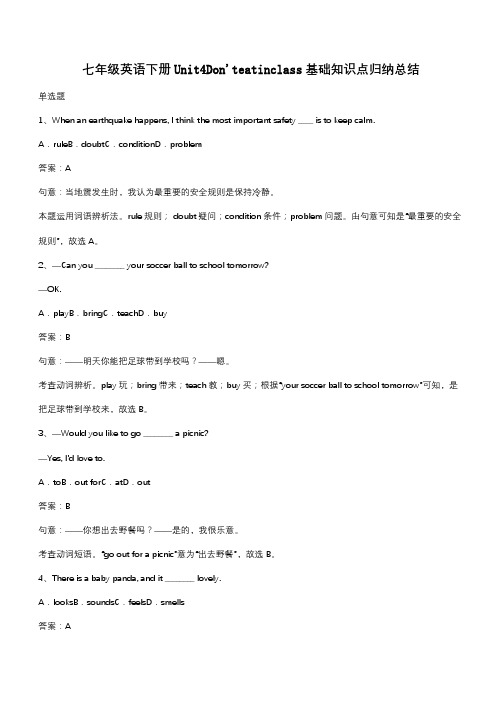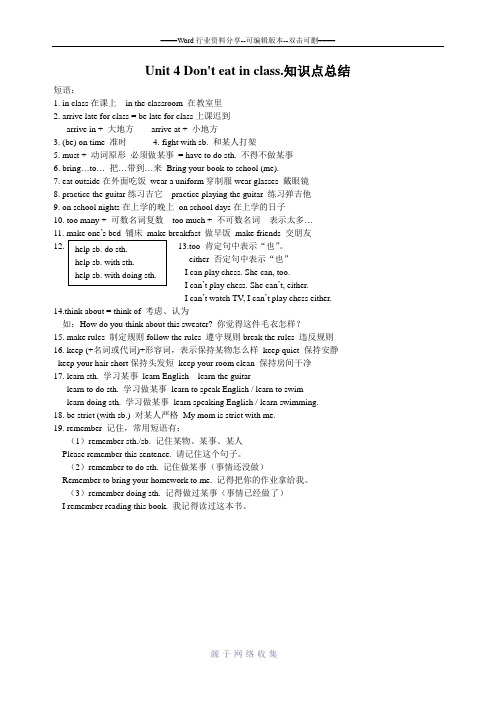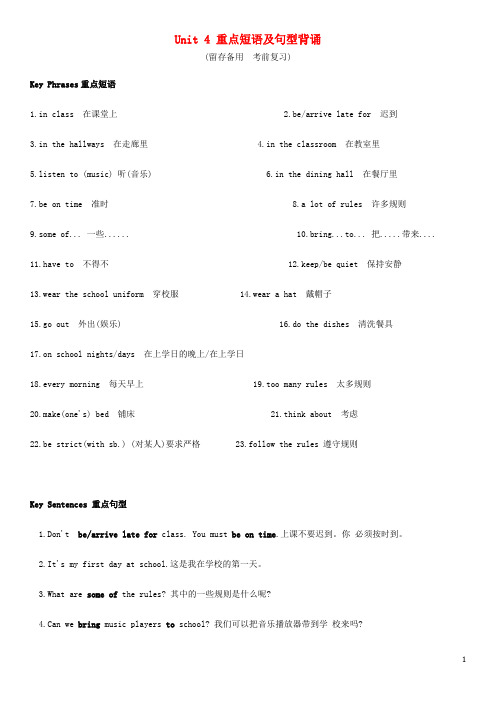七年级英语下册Unit4Don’teatinclass短语、语法知识点汇总(新版)人教新目标版
七年级英语下册Unit4Don'teatinclass基础知识点归纳总结(带答案)

七年级英语下册Unit4Don'teatinclass基础知识点归纳总结单选题1、When an earthquake happens, I think the most important safety ____ is to keep calm. A.ruleB.doubtC.conditionD.problem答案:A句意:当地震发生时,我认为最重要的安全规则是保持冷静。
本题运用词语辨析法。
rule规则; doubt疑问;condition条件;problem问题。
由句意可知是“最重要的安全规则”,故选A。
2、—Can you ________ your soccer ball to school tomorrow?—OK.A.playB.bringC.teachD.buy答案:B句意:——明天你能把足球带到学校吗?——嗯。
考查动词辨析。
play玩;bring带来;teach教;buy买;根据“your soccer ball to school tomorrow”可知,是把足球带到学校来,故选B。
3、—Would you like to go ________ a picnic?—Yes, I’d love to.A.toB.out forC.atD.out答案:B句意:——你想出去野餐吗?——是的,我很乐意。
考查动词短语。
“go out for a picnic”意为“出去野餐”,故选B。
4、There is a baby panda, and it ________ lovely.A.looksB.soundsC.feelsD.smells答案:A句意:有一只熊猫宝宝,它看起来很可爱。
考查动词辨析。
looks看起来;sounds听起来;feels感觉;smells闻起来。
根据“There is a baby panda, and it...lovely.”可知,熊猫宝宝看起来很可爱,故选A。
Unit 4 Don't eat in class知识点 人教版英语七年级下册

Unit 4 Don’t eat in class.【短语归纳】1.上课迟到arrive/be late for class2.准时on time3.在走廊里in the hallways4.听音乐listen to music5.在课堂上in class6.一些规则some of rules7.把某物带到... bring...to...8.穿校服were uniforms9.必须;不得不have to10.保持安静be/keep quiet11. 外出go out12.练习弹吉他practice playing the guitar13.洗碗wash/ do the dishes14.做早饭make breakfast15.整理床make (one’s) bed16.考虑think about17.晚饭前before dinner18.太多规则too many rules19.(对某人)要求严格be strict with sb20.制定规章制度make rules21.遵守/违背规章制度follow/break rules22 留短发keep one’s hair short23.学做某事learn to do sth.24.祝你好运Good luck to you.25.在上学日的晚上on school nights26.到家/到这里/到那里get home/here/there27.玩得愉快have fun=enjoy oneself=have a good/ great/ wonderful time+V-ing【典句必背】1. Don’t arrive late for class. 上课不要迟到。
2. Can we bring music players to school?我们可以带音乐播放器到学校吗?3. And we always have to wear the school uniform.并且我们总是不得不穿校服。
初中英语人教版七年级下册Unit 4 Don’t eat in class知识点整理

七年级英语下册Unit4知识点【Useful expressions】1.No talking 不许讲话 (No+动词ing,禁止......)2.the school rules 校规3.eat in class 上课吃东西4.run in the hallways 在过道上追逐打闹5.in the dining hall 在食堂6.fight with sb.=have a fight with sb.和某人打架7.go out on school nights 在上学期间的晚上外出8.on school days 在上学的日子9.arrive late for class= be late for class 上课迟到了10.wear a/the uniform 穿制服11.have to 不得不;必须12.eat outside 外面吃东西13.practice doing sth.练习做某事14.help mom make breakfast 帮助妈妈做早饭17.too many 太多(+可数复数)18.too much 太多(+不可数)19.so many 如此,这么多的(+可数名词复数)20.so much 如此,这么多的(+不可数名词)21.library rules 图书馆规则22.be strict with sb.in sth.在某方面对某人严格23.be quiet 安静24.be noisy 吵闹25.make the teacher unhappy 惹老师不高兴26.make a noise/make noises 制造噪音27.do the dishes 洗碗28.stay at home呆在家里29.on time 准时30.in time 及时31.learn to do sth.学习做某事32.learn from sb.向某人学习33.follow / keep /obey the rules 遵守规定34.break the rules 破坏规则35.make rules 制定规则36.keep one’s hair short 留短发37.think about 考虑38.make one’s bed 铺床39.in your home 在你家40.at home 在家41.Good luck to you! 祝你好运42.remember doing sth.记得做过某事43.remember to do sth 记得去做某事44.listen to sb.听某人说【Target sentences】1.--What are the rules?--Well, you must be on time for class.Don't fight with your classmates.2.We can’t listen to music in the classroom or hallways.3.--Can we bring music players to school?--Yes, we can./No, we can’t.4.And we always have to wear the school uniform.5.--Does he have to wear a uniform at school?--Yes, he does./No, he doesn't.6.--What do you have to do?--We have to be quiet in the library.7.Don't leave the dirty dishes in the kitchen.8.My dad says I can’t play basketball after school because I must do my homework.9.After dinner, I can’t relax,either.I must read a book before I can watch TV.10.I know how you feel.11.There are a lot of things you can do.12.Parents and schools are sometimes strict but remember, they make rules to help us.13.I think it’s best to follow the rules.14.I can’t go out on school nights.15.I have to do my homework after school.16.I must practice the guitar before dinner.【Language points】1.Don’t arrive late for class.(1)arrive v.到达;是不及物动词,若接地点名词,要加介词in或at。
七年级英语下册Unit4-Don’t-eat-in-class单元知识点汇总

Unit 4 Don’t eat in class。
1.祈使句的构成和用法概念:祈使句是用来表示请求、命令、叮嘱、邀请、劝告等的句子。
结构:祈使句一般以动词原形开头,句末用句号或感叹号.a)Do型祈使句肯定结构:动词原形+宾语+其它否定结构:Don’t+动词原形+宾语Open the door。
开门Don't play soccer in the classroom.不要在教室里踢足球。
b)Be型祈使句肯定结构:Be+表语否定结构:Don’t+be+表语Be careful next time!下次要细心!Don’t be late for school。
上学不要迟到.c)Let型祈使句肯定结构:Let+宾语+动词原形+其它否定结构:Don’t+let+宾语+动词原形+其它Let’s not+动词原形+其它Let’s go home。
我们回家吧。
Don’t let him go shopping。
不要让他去购物。
d)No型祈使句结构:No+动词ing 或No+名词。
这种结构的祈使句一般用来表示禁止.No talking禁止讲话(=Don’t talk=Stop talking)No photos禁止拍照(=Don't take photos)2.短语go out外出(娱乐) You can’t go out on school nights。
在上学的晚上你不能出去(玩)。
take out掏出,取出Please take out a piece of paper。
请拿出一张纸。
do the dishes=wash the dishes清洗餐具Please wash the dishes after dinner。
晚饭后请清洗餐具.think about sth考虑Let’s think about the fruit and vegetables.让我们考虑一下水果和蔬菜。
have fun=have a good time玩得高兴Have fun。
人教版七年级英语下册Unit-4-Don't-eat-in-class知识点总结

Unit 4 Don't eat in class.知识点总结短语:1. in class 在课上in the classroom 在教室里2. arrive late for class = be late for class上课迟到arrive in + 大地方arrive at + 小地方3. (be) on time 准时4. fight with sb. 和某人打架5. must + 动词原形必须做某事= have to do sth. 不得不做某事6. bring…to…把…带到…来Bring your book to school (me).7. eat outside 在外面吃饭wear a uniform 穿制服wear glasses 戴眼镜8. practice the guitar 练习吉它practice playing the guitar 练习弹吉他9. on school nights在上学的晚上on school days在上学的日子10. too many + 可数名词复数too much + 不可数名词表示太多…做早饭make friends 交朋友13.too 肯定句中表示“也”。
either 否定句中表示“也”I can play chess. She can, too.I can’t play chess. She can’t, either.I can’t watch TV, I can’t play chess either.14.think about = think of 考虑、认为如:How do you think about this sweater? 你觉得这件毛衣怎样?15. make rules 制定规则follow the rules 遵守规则break the rules 违反规则16. keep (+名词或代词)+形容词,表示保持某物怎么样keep quiet 保持安静keep your hair short保持头发短keep your room clean 保持房间干净17. learn sth. 学习某事learn English learn the guitarlearn to do sth. 学习做某事learn to speak English / learn to swimlearn doing sth. 学习做某事learn speaking English / learn swimming.18. be strict (with sb.) 对某人严格My mom is strict with me.19. remember 记住,常用短语有:(1)remember sth./sb. 记住某物、某事、某人Please remember this sentence. 请记住这个句子。
七年级英语下册Unit4Don’teatinclass单词、短语及重点句型(新版)人教新目标版

Unit 4 重点短语及句型背诵(留存备用考前复习)Key Phrases重点短语1.in class 在课堂上2.be/arrive late for 迟到3.in the hallways 在走廊里4.in the classroom 在教室里5.listen to (music) 听(音乐)6.in the dining hall 在餐厅里7.be on time 准时 8.a lot of rules 许多规则9.some of... 一些...... 10.bring...to... 把.....带来....11.have to 不得不 12.keep/be quiet 保持安静13.wear the school uniform 穿校服 14.wear a hat 戴帽子15.go out 外出(娱乐) 16.do the dishes 清洗餐具17.on school nights/days 在上学日的晚上/在上学日18.every morning 每天早上 19.too many rules 太多规则20.make(one's) bed 铺床 21.think about 考虑22.be strict(with sb.) (对某人)要求严格 23.follow the rules 遵守规则Key Sentences 重点句型1.Don't be/arrive late for class. You must be on time.上课不要迟到。
你必须按时到。
2.It's my first day at school.这是我在学校的第一天。
3.What are some of the rules? 其中的一些规则是什么呢?4.Can we bring music players to school? 我们可以把音乐播放器带到学校来吗?5.And we always have to wear the school uniform.我们总是得穿校服。
七年级英语下册第四单元重点短语及句型汇总

七年级英语下册第四单元重点短语及句型汇总七年级英语下册第四单元重点短语及句型汇总七年级英语下册第四单元重点短语及句型汇总Unit4Don’teatinclass知识点一.重点短语1.schoolrules学校规章制度2.break(fallow/keep)therules违反(遵守)规章制度3.arrivelateforclass=belateforclass上课迟到4.dininghall饭厅,餐厅5.inclass在课堂上6.ontime准时(intime及时)7.listentomusic听音乐8.wearschooluniforms穿校服9.Isee我明白了10.be(keep)quiet保持安静11.accordingto根据,依据12.make(up)ruler制订规则13.share(sth.)withsb.和某人分享(…)14.onschooldays在上学期间15.onschoolnights在校期间的晚上16.practice(playing)thepiano练习弹钢琴p racticedoing…练习做…]17.goout外出18.clean(one’s)room打扫房间19.dothedishes洗餐具20.toomany/much太多的(可数/不可数)21.gotobed去睡觉(beinbed在床上)22.bestrict(withsb.)对某人要求严格23.Don’ttalk.=Notalking.不要说话24.followrules遵守规则二.用法集萃1.Don’t+动词原形+其他,不要做某事。
2.helpsb.(to)dosth.帮助某人做某事3.toomany+可数名词复数太多的……4.toomuch+不可数名词太多的5.practicedoingsth.练习做某事6.bestrictwithsb.对某人要求严格7.bestrictinsth.对某事要要求严格8.keep+宾语+形容词使……保持某种状态9.learntodosth.学会做某事10.havetodosth.不得不做某事11.leavesthsp.把某物忘在某地三.重点句型1.Don’tarrivelateforclass.Youmustbeontime.上课不要迟到。
Unit4Don’teatinclass.知识点归纳

Unit4Don’teatinclass.知识点归纳一、重点短语schoolrules校规haveto不得不;必须ontie准时intheclassroo在教室里inthehallays在走廊里arrive/belateforclass上课迟到listentousic听音乐bequiet保持安静eartheschoolunifor穿校服10.goout外出11.practicetheguitar训练弹吉他12.dothedishes清洗餐具13.helpsb.dosth.帮助某人做某事14.seefriends看望朋友15.onschoolnights在学习日的晚上16.onschooldays在学习日tooany太多21.bestrict严格要求aeone’sbed铺床22.follotherules遵守规则on/ateeends在周末23.eeptheshorthair留短发0.thinabout考虑24.learntodo学会做......二.重点短语Don’truninthehallays.不要在走廊里跑。
—hataretherules?有什么规章制度吗?—eustbeontieforclass.我们上课要准时。
—caneeatintheclassroo?我们可以在教室吃东西吗?—No,ecan’t,butecaneatinthedinninghall.不,不可以,但我们可以在餐厅吃。
Doeshehavetoearauniforatschool?他在学校必须穿校服吗?—hatdoyouhavetodo?你不得不做什么?—ehavetobequietinthelibrary.在图书馆,我们必须要保持安静。
Therearetooanyrules!有太多规则了。
Don’tleavethedirtydishesintheitchen!不要把脏盘子留在厨房里。
Ican’trelaxeither.我也不能放松。
- 1、下载文档前请自行甄别文档内容的完整性,平台不提供额外的编辑、内容补充、找答案等附加服务。
- 2、"仅部分预览"的文档,不可在线预览部分如存在完整性等问题,可反馈申请退款(可完整预览的文档不适用该条件!)。
- 3、如文档侵犯您的权益,请联系客服反馈,我们会尽快为您处理(人工客服工作时间:9:00-18:30)。
Unit 4 Don’t eat in class一、基础归纳【教材内容解析】Section A1. Don’t arrive late for class. (P. 19)arrive作不及物动词,表示“到达”,接宾语时,需要加上介词in或者at。
When did you arrive?We are arriving at the station at two o’clock.【拓展】reach表示“到达”时,是及物动词,后面直接接表示地点的名词作宾语。
另外两个表示“到达”的动词(get和arrive)都是不及物动词,get to+地点;arrive in/at+地点。
After a long way, they reached/got to/arrived at the top of the mountain finally.2. You must be on time. (P. 19)on time用作固定短语,表示“准时、按时”,in time表示“及时”。
The train arrives on time.The ambulance(救护车) arrives in time.3. Don’t listen to music in class. (P. 19)listen用作不及物动词,表示听的动作,后接宾语时,需要加上介词to,hear强调听的结果,表示“听到”。
This girl likes to listen to music.Can you hear anything?4. Don’t fight. (P. 19)fight此处用作动词,意为“打架”,fight with sb.意为“与某人打架”。
Why do you sometimes fight with others?5. listen to music outside (P. 20)outside表示“在外边”,反义词为inside“在……里面”。
Don’t stay inside all the time. Let’s go outside to play together.6. wear a hat (P. 20)wear此处用作及物动词,意为“穿、戴”,表示穿着的状态,宾语可以是衣帽或者饰品。
She likes wearing a red coat.The young lady wears a pair of sunglasses.【拓展】辨析wear, put on和dresswear 穿着侧重于穿戴的状态The girl wears a red coat today. put on 穿上侧重于穿戴的动作Put on your coat. It is cold outside. dress 给……穿衣服指给自己或者他人穿衣服The boy is too young to dress himself.7. Can we bring music players to school? (P. 20)bring表示“带来”,强调从别的地方带到说话的地方,常与副词here连用;take表示“带走”,强调从说话的地方带去别的地方,常与副词there连用;carry表示“搬、抬”,没有方向性。
The students brought their homework to school in the morning and take them home afterschool.Section B1. practice the guitar (P. 22)practice用作及物动词,表示“练习、训练”,后接名词或者动名词作宾语。
The girl is practicing playing the piano in the room.2. help his mom make breakfast (P. 22)① help sb. with sth. 帮助某人某事Can you help me with my homework?② help sb. (to) do sth. 帮助某人做某事He often helps his mother clean do housework.③ with the help of 在……的帮助下With the help of the doctor, the man gets better.3. There are too many rules! (P. 23)too many意为“太多”,用作形容词时,后接可数名词复数。
There are too many students in our school.【拓展】too much, much too和too many辨析用作形容词,修饰不可数名词I have too much homework to do.too much 太多(的)用作副词,修饰动词Don’t eat too much.much too 太用作副词,修饰形容词和副词The picture is much too beautiful.too many 太多的用作形容词,修饰可数名词复数The little boy has too many questions toask.4. Don’t leave the dirty dishes in the kitchen! (P. 23)leave此处用作及物动词,意为“留下、剩下”,常用的结构为:leave+宾语+地点状语,表示“把某物忘在某地”。
I left my pen in the bedroom.5. After dinner, I can’t relax either. (P. 23)also, too, as well与either都可以表示“也”,但是用法不同。
also 放在句中行为动词前,be动词、助动词和情态动词之后。
He also wants to go. too 用于肯定句中,放在句尾,前面用逗号隔开。
He wants to go, either. as well 用于肯定句中,放在句尾,前面不用逗号隔开。
He wants to go as well. either 用于否定句句末。
He doesn’t want to go either6. Parents and schools are sometimes strict, but remember,they make rules to helpus. (P. 23)(1) sometimes是频度副词,意为“有时”,相当于at times。
I sometimes play computer games on weekends.【拓展】辨析sometimes, some times, sometime与some timesometimes 有时Sometimes he had lunch at school.some times 几次、几倍I’ve been to the museum some times.sometime 某时I will visit Daming sometime this summer vacation.some time 一段时间She has lived here for some time.(2) strict用作形容词,意为“严格的、严厉的”,常用的短语为:be strict with sb.“对某人严格要求”。
She is strict with her son.(3) remember的用法① remember to do sth.“记得要去做某事”,强调动作还没有发生。
Remember to close the door when you leave.② remember doing sth.“记得做过某事”,强调动作已经发生。
I remembered meeting him before. but I was not sure where it is.7. ...I have to/must keep my hair short. (P. 24)① keep sth. 保留某物You can keep the book until the next weekend.② keep doing sth. 一直做某事The thief still kept stealing things after he went out of the prison.③ keep+adj. 保持……The girl eats a little to keep slim.④ keep sb./sth.+adj./介词短语保持某人/某物……We should keep the window open while we are asleep.My mother keeps the vegetables in the fridge.⑤ keep sb. doing sth. 保持某人做某事The mother kept the baby crying on the bed.8. ...because I have to learn to play the piano. (P. 24)learn用作及物动词,表示“学习”,后常接名词、代词或者动词不定式作宾语。
He is learning a second foreign language.Children should learn to walk by themselves.9. I never have fun. (P. 24)have fun意为“玩得开心”,相当于have a good/great time或者enjoy oneself。
have fun doing sth.意为“做某事很开心”。
We have fun learning English.【语法讲解】一祈使句1 祈使句定义用于表达命令、请求、劝告、警告、禁止等的句子叫做祈使句。
祈使句的动词都为一般现在时,句末则使用句号或感叹号。
2 祈使句结构(1)第二人称祈使句通常用来向听话者发出命令,提出要求或建议。
这种祈使句的主语you 通常不表示出来,而是以动词原形开头。
(2)第一、三人称祈使句是以第一人称、第三人称代词或者名词等作为祈使的对象,这类祈使句通常以let为引导词表建议。
3 祈使句的强调形式及否定形式(1)祈使句的强调形式是在整个结构之前加do。
(2)祈使句的否定形式是在整个结构之前加don’t 或never。
(3)以let为引导词的祈使句的否定形式通常是在Let’s 或Let us/ me后加not。
